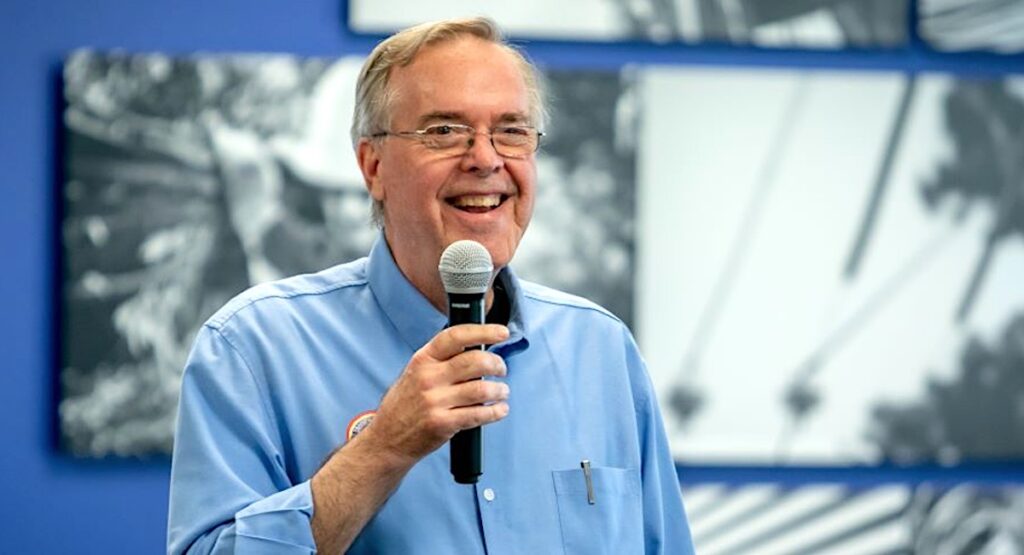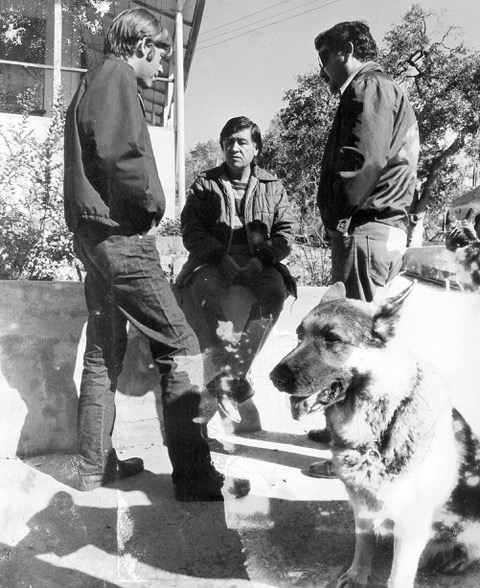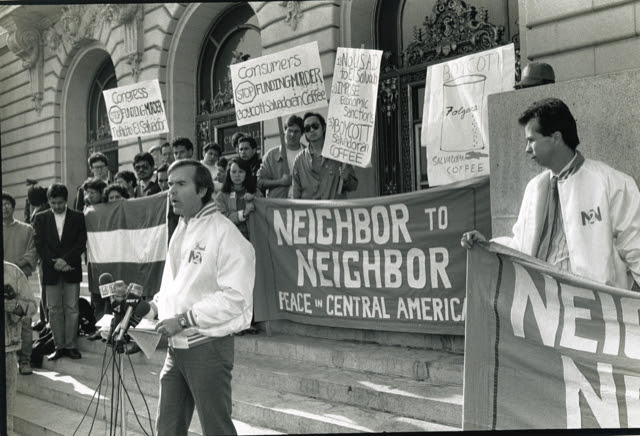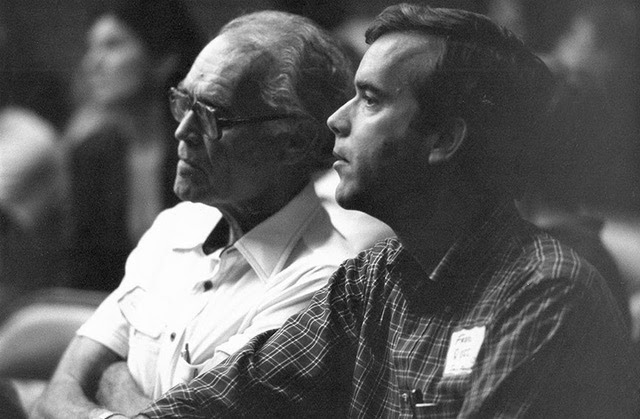
By Louis Freedberg. Ethnic Media Services.
Fred Ross Jr., uno de los principales organizadores de la nación, trabajó para mejorar las condiciones de los trabajadores agrícolas, atacar las causas de la migración de Centro América, y acelerar el proceso de naturalización.
Fred Ross Jr. always wanted to be known simply as an organizer.
Empezó de joven con su trabajo organizativo en los campos de California al lado de César Chávez, y ha inspirado a innumerables personas a lograr un cambio social durante más de medio siglo en el lugar de trabajo y en comunidades por los Estados Unidos.
Ross murió de cáncer el 20 de noviembre a los 75 años
Dolores Huerta, cofundadora con Chávez de la Unión de Campesinos, dijo que hay dos palabras que describen a Ross: humilde y noble. “Siempre era tan positivo en todo,” dijo Huerta, ahora de 92 años. “Tuvimos mucha agitación en el movimiento de los trabajadores agrícolas, pero Fred siempre logró mantenerse por encima de ella. Siguió siendo un estadista.”
Arnulfo De La Cruz, vice presidente ejecutivo de la SEIU Local 2015, recordó haber trabajado con Ross hace dos décadas para sindicalizar con éxito al Hospital Providence de St. Joseph en Burbank, parte de la tercera cadena más grande de hospitales sin ánimo de lucro en el Oeste.
“Aprendí mucho de Fred, especialmente lo importante que es involucrar a toda la comunidad para apoyar a estos trabajadores, a la comunidad de la fe, de la labor, a las personas famosas”, dijo. “Se sentía igual de cómodo hablando en español que en inglés y los trabajadores le tomaron una gran simpatía, especialmente cuando comprendieron el largo legado de su familia en la lucha por los trabajadores.”
Ross siguió los pasos de su padre, Fred Ross Sr., otro organizador legendario que tuvo un impacto profundo en Chávez. “Él me descubrió, me inspiró”, dijo Chávez About Ross Sr.., que lo contrató y capacitó como organizador a los 25 años en San José antes de fundar la Unión de Campesinos con Huerta. “Él pensaba que yo tenía lo que se necesitaba para ser organizador. Me dio una oportunidad, y eso llevó a muchas cosas”.
El talento de Ross Jr. consistía en tomar lo que había aprendido de Chávez y su padre, combinar esas lecciones con campañas sobre el terreno con voluntarios locales, usar de forma inteligente los medios, y presionar a los patrones, los gobiernos estatales, y el Congreso en diversas causas de justicia social.



Ross comenzó su trabajo de organizador a tiempo completo a los 23 años con los trabajadores agrícolas durante la masiva huelga de la lechuga en Salinas en 1970. Una contribución notable fue la organización de una 110 mile march against Gallo wines, desde Union Square de San Francisco hasta la sede de Gallo, donde por lo menos 10,000 trabajadores agrícolas y partidarios llenaron las calles de Modesto.
One of the reasons for the march against Gallo was to pressure Governor Jerry Brown to sign the Ley de Relaciones Laborales Agrícolas, decretada en junio de 1975. Fue la primera ley de su tipo que establecía el derecho de los trabajadores agrícolas a organizarse, votar en elecciones sindicales y negociar con sus patrones.
Ross se valió de reuniones en casas como táctica central a lo largo de su carrera. Ese fue el sello distintivo del enfoque de Ross para organizar: creaba relaciones individuales para, según sus palabras, ejercer “poder colectivo”.
Arturo Rodríguez, que sucedió a Chávez como presidente de la UFW y desempeñó ese papel durante 25 años, dijo que Ross “realmente encarnaba el lema de Sí se puede”. Dijo que la creencia de Ross en las reuniones en casas “durante todas estas décadas ha sido verdaderamente increíble, y me dio fe para continuar el proceso de las reuniones en casas como nuestra manera básica de organizar”.
En los años 80, Ross dirigió Neighbor to Neighbor, que inicialmente se centraba en la grave situación de los refugiados de Centroamérica, pero que se convirtió en un esfuerzo mucho mayor para enfrentar las políticas de EUA en la región que contribuían a que la gente huyera de sus países.
Después de presionar al Congreso para acabar con las ayudas de EUA a los Contras, el grupo rebelde de derechas que luchaba contra el gobierno Sandinista de Nicaragua, Neighbor to Neighbor lanzó un boicot de café salvadoreño to pressure the government to withdraw its support from the death squads. As a result of the pickets formed by Neighbor to Neighbor, los estibadores se negaron a descargar cargas de café en toda la costa Oeste, incluyendo Long Beach.
Después de que los votantes de California aprobaran la Proposición 187 en 1994 promovida por el gobernador Pete Wilson, Ross ayudó a lanzar la Campaña de la ciudadanía activa en Los Ángeles que presionó con éxito al Servicio de Inmigración y Naturalización para que acelerara el proceso de solicitud para la nacionalidad a seis meses.
“No solo tuvimos un papel sustancial en ayudar a que miles de personas se naturalizaran, sino que, y más importante, a que se involucraran mucho más en todo el proceso político”, recordaba Ross poco antes de fallecer. “Eso fue un verdadero avance para seguir creando el poder de votación latino en California”.
Durante el último año de su vida, Ross se dedicó a producir un documental acerca del legado de su padre. La película, que se espera que se estrene en 2023, tiene como objetivo inspirar a otros a organizar, y lo hace destacando el impacto que tiene la organización de las bases populares en el cambio a largo plazo.
“Como en el caso de su padre, las labores de Fred Jr. nunca trataban de sí mismo”, dijo la Unión de Campesinos in a tribute. “Siempre trató de capacitar a los demás para que creyeran que eran ellos los responsables del progreso que conseguían. La naturaleza de Fred Jr. era incesantemente positiva; siempre pensaba que las cosas se podían hacer”.
Fred Ross Jr. is survived by his wife, Margo Feinberg; their son and daughter, Charley and Helen Ross; his brother, Robert Ross; and her sister, Julia Ross. In her memory, the family asks that contributions be made to the documentary project of Fred Ross Sr. through fredrossproject.org. Las condolencias y recuerdos que se envíen a FredrossMemories@gmail.com se compartirán con su familia.
You may be interested in: 40 immigrants became citizens in a ceremony held in Redwood City

